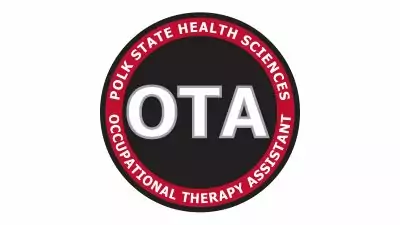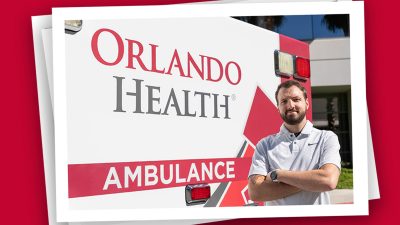Occupational Therapy Assistant
The Occupational Therapy Assistant (OTA) application is open from February 1 through May 31. Interested applicants should note that they must be admitted to Polk State and complete observation hour requirements before applying for the limited-access OTA Program. Veterans of the U.S. Military may also benefit from two reserved seats within the program and should email veterans@polk.edu for assistance with the veteran application. Click here for info sessions to learn more.
What is an Occupational Therapy Assistant?
The Occupational Therapy Assistant (OTA) works under the supervision of an occupational therapist. The OTA teaches individuals with emotional, developmental, and/or physical disabilities new methods or techniques to perform daily activities, and adapts the environment, and/or tasks to maximize independent functioning. “Occupation” (purposeful activity) is used as a means of preventing, reducing, and/or overcoming physical, social, and emotional disabilities in people of all ages.
Program Description
The OTA Program is a 74-credit-hour AS degree program, which trains and qualifies graduates to work in the occupational therapy field.
The OTA Program supports cross-cultural diversification within the program and profession and advocates equal opportunity for all students regardless of race, color, national origin, gender, religion, disability, age, veteran status, or marital status.
National Board for Certification in Occupational Therapy (NBCOT)
Program results from the National Board for Certification in Occupational Therapy (NBCOT) can be found online at https://secure.nbcot.org/data/schoolstats.aspx.
One Bank Street, Ste 300
Gaithersburg, MD 20878
Phone: 1.301.990.7979
info@nbcot.org, https://www.nbcot.org/
| Year | Board Pass Rate |
| 2024 | 83% |
| 2023 | 80% |
| 2022 | 95% |
| 3-year aggregate | 86% |
If a student has concerns regarding eligibility for certification and credentialing, it is the student’s responsibility to contact the OT state board and/or NBCOT in a timely manner.
National Board for Certification in Occupational Therapy (NBCOT®) program data results: https://www.nbcot.org/Educators-Folder/SchoolPerformance (nbcot.org)
+ Graduation Rates
3-Year Reporting: Program Graduates
The Occupational Therapy Assistant program during the three-year period from 2022 to 2024 had an overall graduation rate of 83.43%.
Graduation Year Graduation Rate 2022 81.25% 2023 83.33% 2024 85.714% 3-year aggregate: 83.43%
*It should be noted that students who begin in an original cohort and take a leave of absence or need to repeat a course, a one-year time passes due to the schedule of course offerings and if a pre-requisite course is failed. The student is then added to the next cohort which increases the overall student enrollment.
+ Current Updates
UPDATE 10/04/2022:
General Education Requirement Change
Effective with the Occupational Therapy Assistant Class Starting in January 2023On March 30, 2022, the State Board of Education approved revisions to Rule 6A-10.02413, Florida Administrative Code, Civic Literacy Competency. The amendment adds the civic literacy competency requirement as a condition of graduation for Associate in Science and Associate in Applied Science (A.S./A.A.S.) degree programs.
With the rule amendment, all degree-seeking students will have to meet the civic literacy competency requirement, consistent with the new general education core requirements from House Bill 1507, which passed during the 2021 legislative session. Once effective, students entering A.S./A.A.S. degree programs in 2022-23 and thereafter will be required to demonstrate postsecondary civic literacy competency prior to graduation.
Based on this legislation, effective with the Occupational Therapy Assistant Class starting in January 2023, students will be required to take either POS 1041 “American Government” to fulfill the new civic literacy competency requirement.
These courses replace the previously required HSC1531 Medical Terminology which no longer is a requirement for the Occupational Therapy Assistant Program. Therefore, prospective students who have previously completed either of these courses as part of the general education requirements, will now need to successfully pass POS 1041 to meet the new State civic literacy competency and the revised OTA Program requirements.
PREVIOUS UPDATES:
- HSC2554 Basic Principles of Disease and BSC2086C are encouraged to be taken prior to admission.
- Effective for cohort start January 2023, all applicants must have a 2.5 pre-requisite GPA which applies to those applying in September of 2019.
- To update you on the curriculum credit increase from 70 to 74 (effective for the starting class of 2019) as mandated by the Department of Education, the program will include Medical Terminology as a course (3 credits) which may be taken online or in-person at your choosing, but must be completed prior to graduation.
An additional credit for a capstone component will be added to OTH1520C, Pediatrics.
- Although BSC2086C is not a formal pre-requisite, we strongly recommend this course be taken prior to beginning the program.
(Again, at this time this is a recommendation, not a requirement.) - If unable to take it before the program, it must be taken in Summer A of the year you begin the program prior to Fieldwork Level I.
- Please alert the Program Director once you begin the program if you will be taking this course while in the program so we may work with your summer fieldwork schedule.
- Once admitted to the program you will need to bring your physical and immunization requirements on your first day of class, this is not a pre-admission requirement.
- Background check and drug test will be an admission requirement to be met by the first day of class in January of the year you are accepted, random drug screens may be also conducted throughout the program.
- Membership to the OTA club is open to all enrolled Polk State students under affiliate membership.
+ Program Cost
Background check, fingerprinting, drug screens $260 Book Fees $809.94 Lab Fees $120 Physical / Medical Requirements $250 Tuition Fee $8304.28 Uniform Fee $225 CPR $60 HIV Certification $24 The approximate total program cost is $10,573
*Please note that these fees are subject to change.
+ Class Size
Twenty-four (24) applicants are admitted each year to begin coursework in the spring semester.
+ Program Hours
OTA courses are typically offered from 7:00 a.m. to 8:00 p.m., Monday-Friday, typically two to four days per week. Please note that schedules vary by term and faculty availability.
+ Prerequisites
Eleven (11) credits need to be completed before starting coursework in the OTA Program. CPR and AIDS certifications need to be completed before Level I Fieldwork in the summer.
ENC1101
PSY2012
BSC2085C
Students are strongly encouraged to take BSC2086C prior to beginning the program+ Working Sites
Typical work sites for the OTA are found in rehabilitation units/centers, general hospitals, outpatient clinics, school system, private clinics, nursing homes, psychiatric units, mental health agencies, forensic facilities, developmental disabilities agencies, pediatric agencies, and education, etc.
+ Potential Salary
The OTA position may be salaried or hourly, usually 40 hours a week. In Polk County, a COTA may earn an average of $22/hour if employed full-time with benefits.
US Bureau of Labor Statistics (click here)
+ Certification Examination
Following completion of academic and clinical work, graduates of the program will be able to sit for the National Certification Examination for the Occupational Therapy Assistant, administered by the
National Board of Certification in Occupational Therapy (NBCOT)
One Bank Street, Ste. 300
Gaithersburg, MD 20878
Phone: 1.301.990.7979
Email: info@nbcot.org
https://www.nbcot.org/
The computer-delivered examination is offered on-demand, yearlong. After successful completion of this exam, the graduate will be credentialed as a Certified Occupational Therapy Assistant (COTA).A felony conviction may affect a graduate’s ability to sit for the NBCOT certification exam.
If You Have a Felony in Your Background
See information on Good Moral Character Review or email character.review@nbcot.org or call 301.990.7979.
+ Florida Licensure
Most states require licensure in order to practice; however, state licenses are usually based on the results of the NBCOT Certification Examination. Graduates need to apply for Florida licensure upon successful completion of the Certification Exam. Graduates are responsible for requesting information from the state licensing agency and completing requirements for licensure.
A felony conviction may affect a graduate’s ability to attain state licensure.
+ Essential Requirements
Essential requirements have been established to identify the specific technical standards and skills required of students in the program. Decisions to enroll in the Occupational Therapy Assistant (OTA) Program should be made after considering the program Essential Requirements.
It is the responsibility of the program applicants to carefully review the essential requirements and ask questions if not familiar with the standards and skills listed. Certain chronic or recurrent illnesses and problems that interfere with patient care or safety may be incompatible with occupational therapy training or clinical practice.
Conditions that may lead to a high likelihood of student absenteeism should be carefully considered. Deficiencies in knowledge, judgment, integrity, character, or professional attitude or demeanor which may jeopardize patient care may be grounds for course/rotation failure and possible dismissal from the program. All applicants to the program must have the ability to meet the standards and skills in the Essential Requirements list in order to complete the educational requirements for the Associate in Science in Occupational Therapy Assistant.
If a student cannot demonstrate the standards and skills without accommodation, it is the responsibility of the student to request an appropriate accommodation with the Coordinator for Special Services (in the Student Services Department) before the beginning of the school term. The College is committed to the principle of equal opportunity as defined in the catalog and will provide reasonable accommodation as long as it does not fundamentally alter the nature of the program offered and does not compromise patient safety, or impose an undue hardship such as those that cause a significant expense or are unduly disruptive to the educational process.
Students may be required to travel up to or more than 60 miles to clinical sites.
+ Forms & Schedules
Program application question form
Complete this form by answering the three (3) stated questions. Save and submit this form as part of the application process (Feb. 1-May 31).
Physical Exam Form
To be used only by students who have been accepted into the program. The student needs to take this form to the physician performing the physical exam, ensuring that the physician completes all sections. Once completed, the form is to be submitted to the Academic Fieldwork Coordinator of the OTA program before the first day of class in January. The program accepts titer verification and/or an immunization record.
Resume Template
Use this template to assist you with developing a resume, which is to be submitted along with the application form and observation hours form.
Spring and Fall Schedules
Schedules will be provided at orientation.
Accreditation Status
The Occupational Therapy/Occupational Therapy Assistant Program is accredited by the Accreditation Council for Occupational Therapy Education (ACOTE) of the American Occupational Therapy Association (AOTA), located at 7501 Wisconsin Avenue, Suite 510E Bethesda, MD 20814. ACOTE’s telephone number, c/o AOTA, is 1-800-SAY-AOTA (729-2682) or 301-652-6611, and its web address is www.acoteonline.org.





